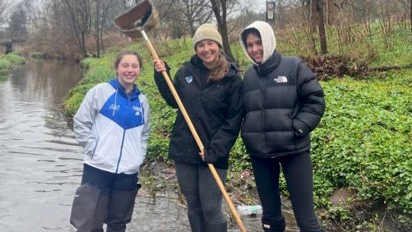Environmental Studies Program Partners With Local Organizations and Internship Opportunities for Experiential Learning
Monday, September 8, 2025

Environmental Studies senior capstone students engaged in surface water monitoring with NJ Watershed Ambassadors Program.
Over the past year, lecturer and now Director of Environmental Studies Jacob Weger, Ph.D., worked to establish relationships with local community organizations to provide opportunities for student engagement and enhance the Environmental Studies program’s experiential learning offerings. This endeavor was successful, as a total of nine local entities (nonprofits, municipal agencies, NGOs and community activists) agreed or expressed interest in collaborating with Seton Hall University's Environmental Studies students.
These partnerships may take the form of collaborating on senior capstone projects, a course offered each spring for Environmental Studies majors, or providing opportunities for student volunteering, internships or independent study projects. Potential partners include organizations like the South Orange Environment Commission (the Green Team), South Mountain Reservation and Turtleback Zoo, the Newark Conservancy, the Ironbound Community Corporation and the New Jersey Environmental Justice Alliance (NJEJA), among others.
This past spring, students in the senior capstone class (Amelia Carson, Madison Walsh and Laura Page) partnered with two organizations to co-design and consult on their group research project: the South Orange Environment Commission and AmeriCorps NJ Watershed Ambassadors Program (NJ-WAP).
After receiving pitches for projects from representatives of multiple local groups, capstone students selected a topic exploring the causes and consequences of surface water runoff in Essex County, with the aim of proposing a solution for more effective water management. With NJ-WAP, they conducted stream water quality surveys to assess levels of pollution in local surface water and with the South Orange Green Team they discussed the use of rain gardens as a potential water management solution, brainstorming the best methods to reach out to local residents and promote their solution in the community.
Students then implemented a joint communication strategy in partnership with the Green Team, creating social media posts on Facebook and Instagram to spread their message about the benefits of rain gardens — including clear and simple instructions for how residents can create their own.
In addition to establishing partnerships with local organizations for research collaborations, Environmental Studies has also created a wider database of potential volunteer, internship and training opportunities in the area and relevant to Environmental Studies majors. Weger will maintain and continue to add to this list, and students interested in finding ways to gain hands-on experience in environmental studies-related fields are encouraged to contact him at jacob.weger@shu.edu.
Categories: Research, Science and Technology






